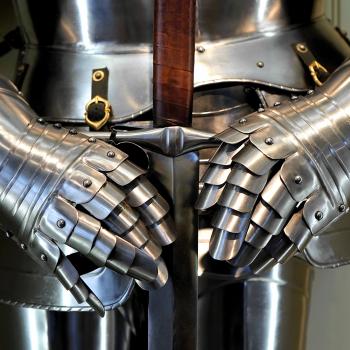To Train Up A Child, chapter 4 part 3
For the past two weeks, I’ve covered Michael’s chapter on “tying strings.” Today I will finish that chapter. In many ways, this chapter is completely at odds with the rest of the book. In fact, it is for that reason that it is quoted by Michael Pearl’s defenders as proof that his methods properly applied could never have led to the three deaths credited to them. But some readers commenting on the last two posts on this chapter have pointed out some ways in which this passage actually makes sense and is consistent with Michael Pearl.
On the one hand, this chapter includes many things that appear to be really good advice—or, at least, that might be good advice if placed in the context of an entirely different book. The trouble is that this advice is given not in the context of another book, but in the context of this book. This advice is given in the context of a book that focuses on forcing children into abject submission and absolute unquestioning obedience to their parents. This advice is given in the context of a book that advises parents to begin spanking their children as young as four months old. This advice is given in the context of a book that portrays children as manipulators out to best parents, and as creatures in need of conquering.
There are those who argue that any book that contains passages urging parents to “tie strings” of kindness with their children cannot be an abuse manual. The trouble is that this fundamentally misunderstands how abuse works. Abusers are rarely uniformly unkind to their victims. Indeed, abusers generally intersperse their abuse with kindness that helps bind their victims to them. Their victims stay with them, holding out for that moment of kindness, that smile, those minutes when everything seems beautiful. In many ways, what Michael does in this book echoes this.
Now on to finish the chapter.
GOD HELP THE FATHERS
“And, ye fathers, provoke not your children to wrath: but bring them up in the nurture and admonition of the Lord (Eph. 6:4).” A father who teases his children to anger can expect them to do the same to others smaller than themselves. On more than one occasion, when scuffling with my boys, I have found myself having fun at their expense (That was when I was bigger than they). They remind me to play by the same rules to which they are bound.
Don’t laugh this off, fathers. If you make your little boy mad while you are having fun, you have created a bully. After all, weren’t you bullying him? The wrath you provoked in him will be stored up until he can release it on one weaker than himself. That wrath can only be put away by his forgiving you. He cannot forgive until he sees your repentance.
If the child is rooted in bitterness, you have a healing and restoration ministry ahead of you. Your heart and life must be fully surrendered to God or you are wasting your time. You will just have to try to stay out of his way. He will be rearing himself. His chances are not good, but don’t increase his bitterness by playing the hypocrite. It is hard enough to make it in this godless world when you have good support; but for a kid filled with bitterness, facing it alone, there is not much hope. Maybe the mother can make a difference. Often a boy just shuts out a father for whom he only has disdain and relates to his mother in a manner that may bring him along in an average way.
Father, if you care for your child’s soul more than your pride, then humble yourself, ask his forgiveness (even if he is just two years old). Then become a patient father and husband. Spend time with your children doing things that are creative—that give them a sense of great adventure or accomplishment. You can’t lead your child closer to God than you are yourself.
Interestingly, Ephesians 6:4 was one my dad talked about a lot. I wonder if this is where he got it. Michael is right that parents can be bullies, and that that is wrong. But there’s a big problem here. Remember from the first chapter what Michael’s idea of a “patient father” is—one who “patiently” trains his small child by putting an object of interest within reach and then punishing the child for reaching for it. Being a “patient” father means something different to me than it does to Michael. And actually, I’d rather include such actions under “fathers do not provoke your children to wrath.” How is tempting your child to do wrong and then responding by causing them physical pain anything but provoking and bullying a child?
Second, notice that Michael’s concern for the child is not for the child but for the child’s soul. For Christian’s of Michael’s stripe, saving an individual’s soul is always of the utmost importance, more important than anything else. And this may sound odd, but from my perspective today as someone who no longer believes in God, that feels incredibly objectifying. And while he talks of fathers humbling themselves and apologizing to their children, I know what that apology is supposed to look like. It’s an apology for not loving and treating with kindness, yes, but also for not training properly, and a resolve to change that. Michael’s concern for a child’s soul is bound up with a conviction that, for the wellbeing of their souls, children must made to submit to their parents completely and without question, for how else will they learn to submit to God? That rather shapes how that apology appears, doesn’t it?
WHAT CAN I DO NOW?
Tie some strings. You must be knit together with your child before you can train him. Confess your failure to God and to your child. Ask your child to forgive you for anger and indifference. At first they will suspect it is just a manipulative ploy on your part and will keep their distance; so you must begin rebuilding.
Don’t barge in and overpower them with emotion or a new philosophy. Be a friend. Do with them the things they enjoy doing. Be caring. Be more ready with your ear than you are with your mouth. Be very sensitive to their concerns. Tie strings until you have earned their respect and honor. If they sense that you like and enjoy them, they will respond in kind. When they like you, they will want to please you and will be open to your discipline.
The strongest chord of discipline is not found in the whip; rather, it is the weaving together of the strings of mutual love, respect, honor, loyalty, admiration, and caring. It is the difference in being “led by the spirit” and being “under the works of the law.” The law gives us direction, but only the spirit of grace gives us power. If you will cultivate fellowship with your child, you will have such cooperative compliance that you will forget where you last left the rod.
Do you realize what “you must be knit together with your child before you can train him” means? It means that if your child doesn’t have an emotional connection with you, you won’t be able to cow them into abject submission and obedience. And do you remember earlier when, on Michael’s advice, a mother apologizes to her rambunctious children for her failure to properly train them, and then sweetly informs them that things are changing, and that absolute obedience and complete submission will be expected henceforth? That’s what I think about when I read about parents’ need to confess their failure to their children and ask for their forgiveness.
I’m also reminded of a later passage where Michael gives advice to parents just starting to train a child. What advice? “Know that if he is accustomed to getting his unrestricted way, you can expect just such a response [angry screaming]. He will just continue to do what he has always done to get his way. It is his purpose to intimidate you and make you feel like a crud pile. Don’t be bullied. Give him more of the same. . . . If the crying turns to a true, wounded, submissive whimper, you have conquered; he has submitted his will. If the crying is still defiant, protesting and other than a response to pain, spank him again. If this is the first time he has come up against someone tougher than he, it may take a while.” Oh right, that advice. As to Michael saying not to “overpower” a child, he specifically and intentional advises parents later to do just that: “Prove that you are bigger, tougher, more patiently enduring and are unmoved by his wailing. Defeat him totally. Accept no conditions for surrender. No compromise. You are to rule over him as a benevolent sovereign. Your word is final.” So much for not overpowering a child!
I’m also put off by the fact that Michael’s focus here is on obtaining “compliance.” Yes he uses the word “cooperative,” but what really is “cooperative compliance”? I’m reminded of the way that Michael emphases in his book for men that husbands are to “cultivate” their wives in order to turn them into proper “help meets” who will serve their husbands’ needs. The focus isn’t on the good of the other individual, it’s on what can be done to get the other individual to be compliant. Of course, Michael does in other passages appear concerned for children’s souls in addition to their compliance.
And note what is said—that they’ll be so compliant “you will forget where you last left the rod.” Noncompliance is to be met with the rod, not simply with tying strings. Bear this phrase of Michael’s in mind as you read this next sentence:
WALKING IN THE FATHER’S LIGHT
I can remember an incident that occurred when I was only four years old. Several of us, about the same age, were walking along behind a row of houses when one of them suggested that we throw rocks at a basement window.
I can still remember my thought processes. As I considered doing it, I saw my Daddy’s face. He never told me not to break windows, but I knew he would not be pleased. I had no law to go by, but I had my father’s presence to guide me. It was not fear of punishment or scolding that motivated me. It was my fellowship with my father that I dared not jeopardize. To please him and enjoy his favor was my strongest impulse. I withdrew from the window breaking party and walked in my father’s light.
My father was not perfect. He wasn’t even the best of Christians, but I was not yet aware of that at four or even ten years of age. To me, he was law and grace. As I grew older, I slowly (sometime with a jolt) came to see him as just another struggling member of the human race. Still, I never outgrew that desire to please him.
But, as my confidence in him waned, my confidence in God grew. With the eventual transfer of my faith to God (as it should be), I found myself still motivated not by the law and a fear of hell, but by the face of my Heavenly Father. Today, I have a double lighted path.
Parent, above all, you must cultivate that kind of a relationship with your child. It is a painful thing to sin against your best buddy. If you can maintain this bond with your child you will never have a problem child.
You know how it grates when something is almost right but not quite there? It’s like nails on a chalkboard, and that’s how I feel about this section. My children want to please me, but you know what? They’re also not afraid of my disapproval if they step out of line. When I was a child, I did want to please my parents—but I also knew that the consequences if I displeased them would be painful, not just physically but also emotionally. And the idea that Michael was motivated by a desire to please his father rather than by a fear of punishment or scolding—if that’s what he’s going for with his parenting advice, he may want to rethink his emphasis on the rod. Michael’s love affair with causing children pain makes it almost inevitable that children raised on by parents following his methods will be motivated by fear of punishment. Further, if Michael was serious about wanting children to obey out of a genuine desire to please, he also needs to very clearly tell parents not to punish their children emotionally if they step out of line, something he has not done.
Oh, and the bit on shifting his confidence in his father to confidence in God is interesting. I’ve written before that I feel like Michael Pearl is echoing divine judgement in the earthly judgement he teaches parents to exercise. After all, Michael teaches that parents must require absolute obedience of their children and employ the rod as punishment. Even so, Michael’s version of God requires absolute obedience and throws unrepentant transgressors in hell. Michael’s claim that his confidence in his father was motivated by love and that his confidence in God is also motivated by love ignores the fact that in Michael’s view, both the perfect father and the perfect God do wield the powerful threat of punishment.
Oh, and also? This contradicts what Michael’s wife Debi has said about God—and about the importance of fearing God.
Finally, it’s worth noting that Michael says that if you make this bond with your child, you will never have “a problem child.” For Michael, remember, a good child is completely compliant and absolutely unquestioningly obedient. A “problem child” is one who is not so. If you tie strings, Michael says, you’ll get a compliant and obedient child as a result. If you don’t, you’ll get a child who—gasp!—talks back.
SEEING GOD IN DADDY AND MAMMA
When the child is young, the parents are the only “god” he knows. As he awakens to Divine realities, it is through his earthly father that he understands his heavenly Father. Fathers (and mothers also), you are the window through which your young child understands God. A child learns of the character of God through observing the parents. The parents do not have to be perfect, just a mini-caricature representing a balance of God’s personality. All that God is in infiniteness, the parents should display in the finite. The parents need not be all-powerful, just the child’s source of strength. The parents do not have to be all-wise, just wise enough to guide the child and warrant admiration. The parents need not be sinless, just demonstrate a commitment to the good and holy. As the child sees the parents’ humble dependence on and love for God, because he loves and respects his parents, he will love and honor the one the parents love.
As the child relates to the figurehead of authority (his parents), in like manner he will later be prone to relate to God. If, when the parents say, “No,” they do not mean ‘”No,” then the “thou shalt not” of God will not be taken seriously either. Children with cruel fathers usually mature with a foreboding of their heavenly Father. Those disciplined to lovingly obey their earthly fathers are more ready to obey their heavenly Father.
And here enters obedience. Parents should be kind and loving and worthy of admiration, but just as with God, their word should be final and they should demand absolute obedience.
YOU CAN TIE STRINGS
If you feel the strings are cut, you will want to tie new ones. Here are just a few suggestions on tying strings:
* First and foremost, look at your child with pleasure and smile.
* Enjoy their company and demonstrate it by inviting them to go with you when there is no reason but their presence. For the young, look at pictures or read a book together.
* Sit on the floor and play. Tumble and roll, laugh and tickle.
* Take them on outings of adventure, excitement and “danger.”
* A ten minute trip to the tree-house to see their creations.
* Let them lead you out to the swing to show off their latest stunt.
* Make a kite or build a bird house together.
* Mother, teach your children to do everything that must be done in the house. Make it all a fun experience. Don’t use the very young as slave labor, they will experience burnout. Let them bake cookies at three years old. When you are sewing, let the young ones sit on the floor and cut out doll clothes. When you are painting, let them make a few swipes.
* Fathers, by their participation, let the boys feel they are the protectors and providers of the house. If they can walk, they can carry in groceries or bring in firewood. Brag on their achievements.
The idea is for them to feel that they are very special to you, and to know that you find great satisfaction and delight in sharing with them. If you order your life so your children feel needed, they will desire to walk in harmony with you.
These things are great advice—again, coming in another book there would be nothing wrong with them. My parents were followers of the Pearls, and they did everyone of these things—and they combined them with the requirement that we obey them absolutely and completely. The good times were amazing, and the bad times were . . . well. And that’s the problem here. Michael is so caught up in the idea that children must obey their parents absolutely and submit to them without question that he poisons any good advice he might otherwise have. In the end, he is primarily bound up in the need for control.
This chapter is now at an end, but I read the beginning of the next chapter and it is a perfect illustration of how inadequate—and how out of sync—this section is. Here, then, are the first two paragraphs of the next chapter, titled “The Rod”:
I observed a child possessed of continual discontent. His mother was vainly trying to elicit obedience to a simple command. He was miserable, constantly complaining, whining and angry. The mother, made miserable by the little tyrant’s rebellious antics, was ill-tempered toward him. But she continued to plead with him as if she were trying to remember what it was she heard about “positive affirmation” and not “stifling his personal expression.”
As an objective observer, concerned for the child’s happiness and well being, I said to the mother, “Why don’t you give him a spanking and make him happy?”
There is nothing here about tying strings. Nothing about connecting with your child, bonding with them, loving them. Nothing about the mother’s own ill-temper being part of the problem, and about the importance of smiling at your child, wrestling on the floor with her, and engaging in creative activities together. No. Nothing.









